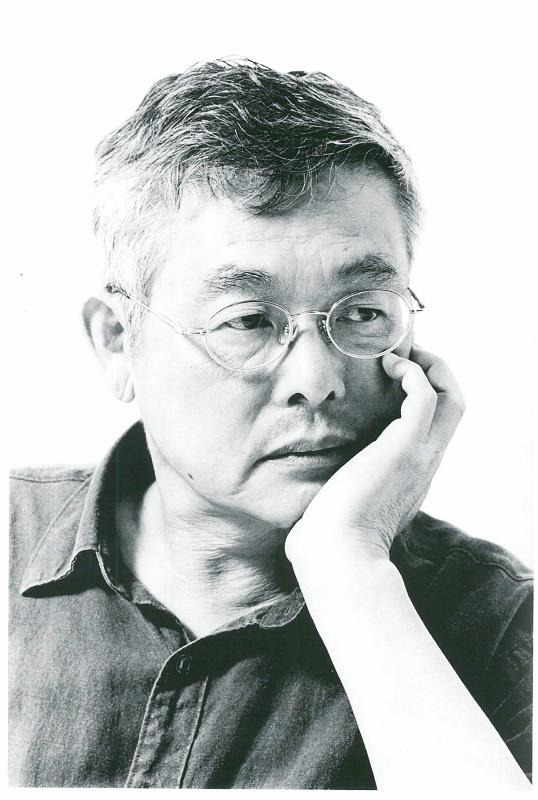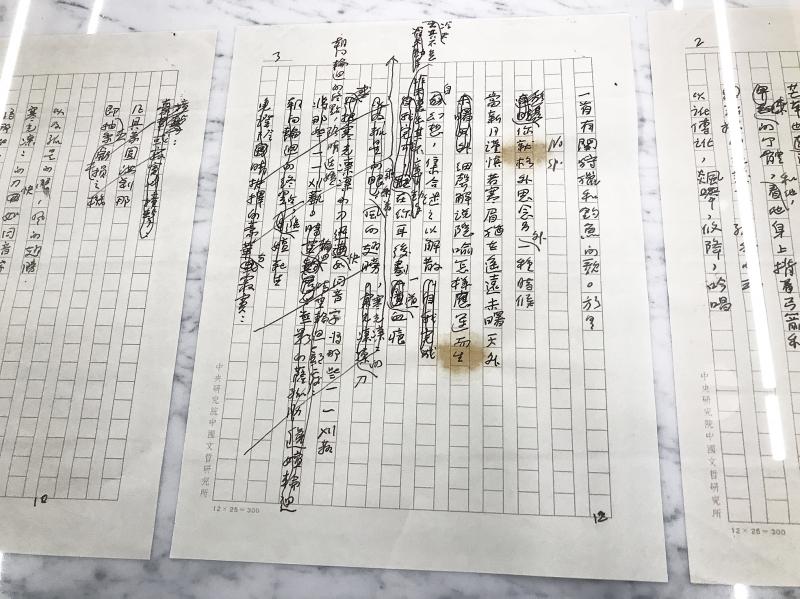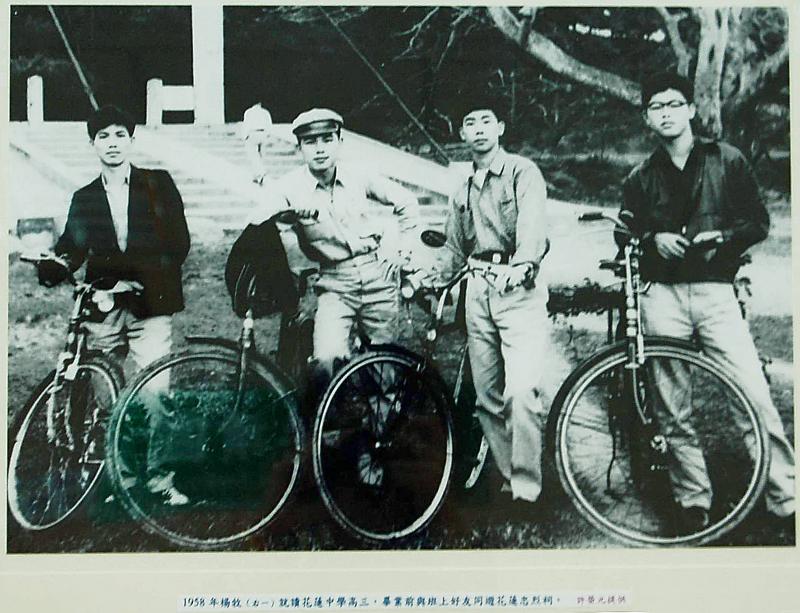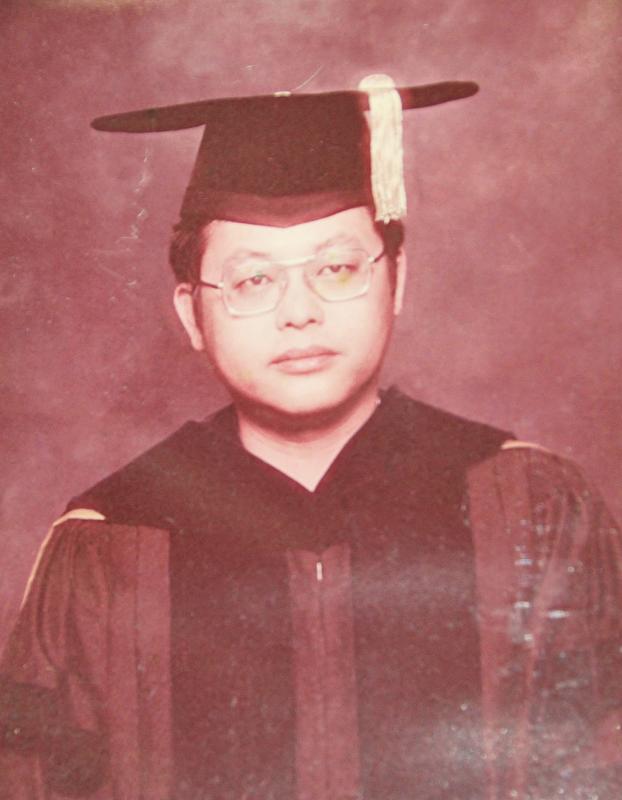March 23 to March 29
Yeh Shan’s (葉珊) prolific writing career came to an abrupt end in 1971 after publishing his poetry collection Legend (傳說). When he reemerged two years later at the age of 32 with the essay Annual Ring (年輪), he had become Yang Mu (楊牧).
Yang foreshadowed Yeh’s demise in the foreword to Legend: “These past five years have been a rare confirmation that not even for a moment have I been able to persist with one style, one perspective and one technique; instead, amidst constant change, I’ve never stopped rejecting, denying and destroying my past … This [has happened several times before] but never as cruel and thorough as the past five years.”

Photo: CNA
Yeh represented the romanticism, sentimentality and innocence of the poet’s youth. When he became Yang, he “gained a layer of calmness and subtlety, and started to create works that criticized society,” states the introduction to the Public Television Service documentary Towards the Completion of a Poem: Yang Mu (朝向一首詩的完成).
“Change is not easy, but not changing means death. Change is painful, but change is the truth of life,” he says in the documentary. As we all know, the only thing that doesn’t change is death (and taxes).
When Yang died on March 13, he was known as one of Taiwan’s most acclaimed literary figures, leaving behind an impressive body of poems, essays, critiques and translations. Before he died, his wife Hsia Ying-ying (夏盈盈) read him his work Cloud Ship (雲舟):

Photo: CNA
All the tangibles and intangibles have been explored
now we with our bright hearts are determined to reach the other side of
the stars, on a ship with pure white sails, or on the wings

Photo courtesy of Hualien County Cultural Affairs Bureau
of the archangel, who has been waiting for us all along
many years ago an extant prophetic book
foretold a time when all will be transported

Photo: Hua Meng-CHIN, Taipei Times
in the melody of a song. In steady twilight breeze
on a gently swaying ship of clouds, the joyful soul
UNDER MOUNT QILAI
Long before Yang became Yeh Shan, he was Wang Ching-hsien (王靖獻). He was born in Hualien in 1940, just before World War II heated up in the Pacific.
“The flames of war burned in the distant sky, but hadn’t reached my ocean, my small city, my courtyard covered with a dense canopy of leaves,” Yang writes in Memories of Mount Qilai (奇萊前傳), a collection of autobiographical essays.
The book opens with Yang as an introspective and observant child, listening to the sound of the Pacific ocean, observing the sunlight piercing through the leaves while a beetle glided to the ground, and crunching the fallen leaves with his wooden sandals.
“The flames of war had not reached Hualien.”
Eventually they did, as the Americans conducted airstrikes in the area as part of its bombardment across the Japanese colony. Yang recalls that the Japanese were building an airstrip nearby for kamikaze pilots when the war suddenly ended, sparing his hometown from further destruction.
When Yang turned 16, he began submitting poems to the Public Opinion Press (公論報) poetry supplement under the pen name Yeh Shan, eventually starting a poetry magazine with an older schoolmate.
At the Department of Foreign Languages and Literature at Tunghai University, Yang voraciously devoured the works of British Romanticist poets such as William Wordsworth and John Keats. At the age of 20, he self-published his first poetry collection On the Water Margin (水之湄) through his father’s printing press. It was proofread by his sister.
In the afterword, he writes: “The greatest satisfaction for a poet is when he writes for a star, or a cloud, that star, that cloud understands his language; when he writes for a person, that person understands his language. I can’t remember how many poems I’ve written, but in my heart, I remember all the people that appeared in my poems, even if they don’t know it. That is sadness. A person always carries some sadness, but that of a poet is especially heavy.”
LEAVING THE PAST
The transformative five years that Yang mentions in the foreword of Legend begins around the time he earned his master’s degree from the Iowa Writers Workshop at the University of Iowa. When he first arrived, he would write letters to his literary hero Keats, who had been dead for close to 150 years. Upon graduation, he wrote to Keats for the 15th and final time: “I find the rainbow boring and excessive, I feel the dullness and clamor of the spring rain, I can no longer grasp the joy of birds chirping. I watch feathers fall from the maple trees, and the elm fruits cover the sky, but those early infatuations can dissipate. Poet, this is my last letter to you.”
Yang thought of becoming a war correspondent, but instead he moved to Berkeley to continue his studies in 1966. It was a hotbed of liberalism and social activism in the 1960s, and Yang arrived just after the Free Speech Movement protests of the 1964-1965 school year at UC Berkeley, one of the first of many demonstrations held on college campuses throughout the decade.
But Yang had little interest in social issues when he arrived, writes Chang Hui-ching (張惠菁) in his biography Yang Mu (楊牧). He was on a scholarship that also covered his living expenses, and didn’t have to venture much into the real world just yet. In 1967, the anti-Vietnam War protests reached its height at Berkeley, and Yang often saw students clashing with the police. He became particularly incensed when he watched the government uses airplanes to spray tear gas over students.
He fully felt the passion and anger of the protestors, Chang writes, but he did not participate, although the activities still made an impact on him as an observer.
“Berkeley made me open my eyes and observe and recognize this society with urgency,” Yang writes. “While knowledge is power, knowledge should not be limited to academic institutions. Knowledge is only power when it is liberated and applied to the reality of society.”
Yang’s concern was not just about how to become more involved with society, but how to become involved without being swallowed whole. In 1970, the baodiao (保釣, “protecting the Diaoyutais”) student movement exploded among Taiwanese students in the US, and “everyone became involved in different ways to different degrees,” he writes. Many of his classmates didn’t finish their studies as a result.
Yang earned his PhD in 1971. He secured a job in Seattle, and returned to Taiwan for the first time in eight years in 1972.
“On the second day back in Hualien, Yang woke up at 4am and went for a stroll. By the fields, he saw people bent over planting water spinach. He looked at the mountain that had not changed, and suddenly tears fell from his eyes,” Chang writes. In Seattle, he wrote about how salmon always return to where they are born, but people easily get lost.
Later that year, he became Yang Mu.
Taiwan in Time, a column about Taiwan’s history that is published every Sunday, spotlights important or interesting events around the nation that have anniversaries this week.

Jacques Poissant’s suffering stopped the day he asked his daughter if it would be “cowardly to ask to be helped to die.” The retired Canadian insurance adviser was 93, and “was wasting away” after a long battle with prostate cancer. “He no longer had any zest for life,” Josee Poissant said. Last year her mother made the same choice at 96 when she realized she would not be getting out of hospital. She died surrounded by her children and their partners listening to the music she loved. “She was at peace. She sang until she went to sleep.” Josee Poissant remembers it as a beautiful

For many centuries from the medieval to the early modern era, the island port of Hirado on the northwestern tip of Kyushu in Japan was the epicenter of piracy in East Asia. From bases in Hirado the notorious wokou (倭寇) terrorized Korea and China. They raided coastal towns, carrying off people into slavery and looting everything from grain to porcelain to bells in Buddhist temples. Kyushu itself operated a thriving trade with China in sulfur, a necessary ingredient of the gunpowder that powered militaries from Europe to Japan. Over time Hirado developed into a full service stop for pirates. Booty could

Lori Sepich smoked for years and sometimes skipped taking her blood pressure medicine. But she never thought she’d have a heart attack. The possibility “just wasn’t registering with me,” said the 64-year-old from Memphis, Tennessee, who suffered two of them 13 years apart. She’s far from alone. More than 60 million women in the US live with cardiovascular disease, which includes heart disease as well as stroke, heart failure and atrial fibrillation. And despite the myth that heart attacks mostly strike men, women are vulnerable too. Overall in the US, 1 in 5 women dies of cardiovascular disease each year, 37,000 of them

Before the last section of the round-the-island railway was electrified, one old blue train still chugged back and forth between Pingtung County’s Fangliao (枋寮) and Taitung (台東) stations once a day. It was so slow, was so hot (it had no air conditioning) and covered such a short distance, that the low fare still failed to attract many riders. This relic of the past was finally retired when the South Link Line was fully electrified on Dec. 23, 2020. A wave of nostalgia surrounded the termination of the Ordinary Train service, as these train carriages had been in use for decades